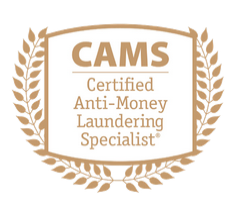ACAMS conference sketch: what MLROs are thinking now
Chris Hamblin, Editor, London, 26 May 2016

Compliance Matters attended the anti-money-laundering 'event of the year' yesterday in London as guests of the Association of Certified Anti-Money-laundering Specialists or ACAMS. The hottest and most oft-discussed topic among the 500 delegates was terrorist finance.
Most attendees were from the banking community, with a smattering from fund management and insurance. They spoke at length about the operational problems that they were encountering when looking for terrorist funds, especially a lack of intelligence to begin with. As one speaker put it: "Without names and targets, it's very difficult for the industry to identify suspicious parties. There are also difficulties in operationalising [many words of this kind were bandied about at the conference] indicators. There are also obstacles in the sharing of information. Much is classified and privacy issues inhibit our efforts."
The European Union is now looking at ways to close gaps in the way that financial intelligence units share information with each other. Some cannot do this until a bank has sent off a suspicious transaction report. The EU's aim is to move from a suspicion-based system of reporting to an intelligence-based one, although details of this were not forthcoming.
MLD IV - some statistics from the coal face
Also on the topic of the EU, the money-laundering reporting officers were asked the question "what aspects of the EU's fourth money-laundering directive will have the greatest impact on your firms?"
The new beneficial ownership requirements accounted for 46%; screening for politically exposed persons (a group that the directive is expanding) accounted for 23%; the risk-based approach to regulation accounted for 7%; and the insertion (for countries which, unlike the UK, do not have it yet) of tax evasion as a predicate offence accounted for 17%, with 7% left over for various other things. Nobody listed "ability to outsource/rely on other group companies for customer due diligence work."
A German compliance officer with a sense of humour
'De-risking' or the deletion of various groups from a financial institution's clientele on account of regulatory danger was a much-mentioned topic, as it is at every money-laundering conference. Markus Schulz of Standard Chartered Bank had gone to the Wolfsberg Group meeting last week and reported to the audience: "There's no solution! You let them go somewhere else." He later joked: "Don't do correspondent relationships, don't do private banking, don't have high-net-worth individuals, and you'll be OK!"
KYC statistics
When another panel asked the huddled masses what they thought their organisations' greatest 'know your customer' challenge was, 18% plumped for the identification of the beneficial owner, 2% for the location of KYC information when requested, a thumping 48% plumped for betting the business to understand and 'own' the risks identified, and the remaining 32% said "all of the above."
How many of the attendees' institutions were taking an enterprise-wide approach to KYC? Yet another panel asked them and the results were: yes 42%, no 38, and 'in the making' 20%.
Risk appetite
The appetite of each firm's board of directors for risky business (whether it be politically exposed persons or something else) was also a hot topic at the conference, with most commentators saying that regulators were now interested in knowing something about each firm's risk appetite. Markus Shultz said that in the area of wealth management this meant a look at whether the firm in question was forsaking clients connected with ultra-high-risk countries, or setting limits on the percentage of clients from highly risky countries; or setting limits on the number of ultra-high-risk clients. There was much praise and reverence for publicly available league tables of country risk such as the Transparency International 'Corruption Perceptions Index' but there was also a worrying new trend among some speakers who argued that it was no longer enough to follow such indices blithely and that every firm ought to be doing its own evaluations.
ACAMS training
The association awards its qualifications to people who pass a multiple-choice examination with 50 or so questions and five choices per question. The questions are difficult because each answer is plausible, so the examinee must work out the most probable and realistic answer. Notes are downloadable from the ACAMS website.
One attendee from a large Anglo-Asian bank told Compliance Matters that her employer-firm insisted on her having a money-laundering compliance qualification of some sort and that the ACAMS one involved the least effort. She took her examination in 2010 and has been allowed to put 'CAMS' after her name ever since, contingent on the bank paying ACAMS an annual fee.












